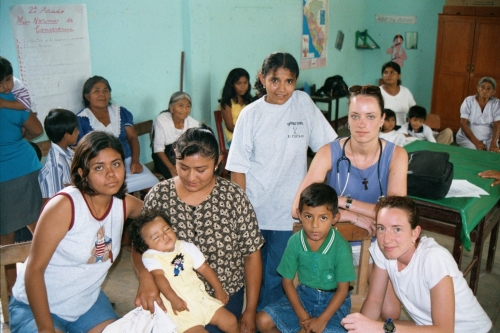Lessons learned far from the College of Nursing
Notes from our “International Traveling Faculty Pioneers”

Villanova University College of Nursing began offering an international option for senior nursing students as part of their Nursing and Health Promotion clinical experience in 1999. Part of an Augustinian university, the College of Nursing partnered with the Augustinian mission in Chulucanas, Peru. Early trips were often a leap of faith on our part as well as on the communities we worked with. Communication was difficult in the beginning and remains inconsistent. For example, in the early days, our partners in Chulucanas did not have internet access. We hoped that there was someone waiting for us when we arrived and they hoped that we would be able to relate to them as partners and offer useful information. We were never disappointed as we provided basic health information in the areas of health promotion and disease prevention and management. During the time in country, health information was gathered to guide the planning for the following year.
We had to step back and recognize that Western medicine was either not available or would require a community member to travel long and difficult distances, was expensive and often was just not offered. On one first visit we came upon an older man who was home with an obvious broken hip. He had tied his legs together with a chord. He would never walk again and was living in pain. This was hard to see and we were unable to understand how to access the needed resources.
Faculty needed to assist the students to understand the complexity of teaching in a community with limited resources and education. The students’ sources of material were from our highly developed health system. When we educated community members about a common health problem, we needed to first provide a basic overview of the involved body system. We were rewarded by this approach when a community participant called the student presenter over with tears in her eyes saying, “Thank you, I never knew how my lungs worked.” We provided double-sided laminated printouts for the health promoters to carry back to their community members to use as teaching tools.
The value of collaborating with the community and fostering on-going relationships cannot be overstated. The College of Nursing has partnered with the community health promoters in each community over a number of years. Nursing students teach basic health assessment skills like taking a pulse, blood pressure and blood sugar monitoring to interested members of the community. Lessons on hygiene, safety, nutrition, disease prevention, and wound care enable the health promoters to take on more responsibility providing health care to their remote communities. An example was demonstrated when we learned of the promoters using a student’s presentation on hepatitis to teach their community members long after our visit.
Home visits were an integral part of the learning experience providing first hand observation of life in a different culture and how families manage with limited resources. Repeated visits were made to a young girl who suffered severe burns. Students taught wound care and provided developmental guidance to her mother over multiple years.
As we learned, reflection throughout the experience was integral. Students can feel as if they are not making an impact because the knowledge they are “only teaching” and they may never know how the health promoters use that information. One example of this is the student who broke down because she “wasn’t giving anything tangible to the promoters.” She had instructed the promoters on the Heimlich maneuver. The faculty explained that her instructions may save a life; she will never know this but should take comfort in that knowledge.
Students traveling outside the United States are reminded of how valuable their nursing education is. They are humbled by the respect of the community members as they consulted with the students, asked clarifying questions about the presentations and the nursing skills the students demonstrated. One example of the lasting value of the nursing student contribution to the community was demonstrated by a ninety year old woman who walked miles to return the following year to thank the nurses for “saving her life.” Care for an infected foot provided the previous year enabled the woman to correctly care for her foot.
